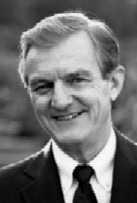« October 2004 | Main | December 2004 »
November 15, 2004
Gordon Bower
DECISION SCIENCE RESEARCHER PROFILE: GORDON BOWER

Dr. Gordon Bower is considered one of the nation's leading experimental psychologists and learning theorists. He did some of the earliest work investigating the effect of mood states on memory. In 1959 he received his PhD with distinction from Yale University. That same year Dr. Bower became a member of the psychology faculty at Stanford University and has remained there ever since. Both his research and his Chairmanship of the of the psychology department are in large part responsible for the establishment of Stanford University as a top rated research institution. In 1973, he was elected to the National Academy of Sciences. He served as Senior Scientist for the National Institute of Mental Health (NIMH) in 1993. During that time Dr. Bower co-chaired a panel of scientists gathered together from across the behavioral and social sciences to investigate the current state of mental-health knowledge in those fields. From that work came a guide to develop NIMH into the 21st century entitled Basic Behavioral Science Research for Mental Health: A National Investment. Dr. Bower has also served as president of The American Psychological Society and the Western Psychological Association, and as Senior Science Advisor to the American Psychological Association.
Currently, Dr. Bower is the A. R. Lang Professor of Psychology at Stanford University. Beyond his own research, he contributes to the strengthening of institutions that support scientists. Dr. Bower's research on the role of emotions in learning has played a significant role in the current resurgence of interest by scientific researchers into the study of emotion.
Field of Expertise and Research Interests:
Conditioning, Learning, Memory, Language Comprehension, Mathematical Models, Computer Simulation of Memorial Processes, Behavior Modification
Academic Career:
1959-present Professor of Psychology at Stanford University
Selected Honors and Affiliations:
1993-Present Science Directorate American Psychological Association, Board of Scientific Advisors
1993-Present Elected Chief Scientific Advisor American Psychological Association, Board of Scientific Advisors
1993 Honorary Doctorate of Science Indiana State University
1992-1993 Senior Science Advisor National Institute of Mental Health, NIH
1991-1993 President American Psychological Society
1991 Honorary Doctorate of Humane Letters University of Chicago
1990-1991 President Western Psychological Association
1989-1990 President Elect Western Psychological Association
1989 President Society of Experimental Psychologists
1989 William James Fellow Award American Psychological Society
1987-1988 Elected Chairman of the Governing Board and President Cognitive Science Society
1983-1986 Associate Dean of Humanities and Sciences Stanford University
1978-1982
Chairman, Stanford University, Psychology Department
Research Advisor, National Institute of Mental Health, NIH
Research Advisor, American Psychological Association
Distinguished-Chair Professor, Stanford University, Psychology
Department
1973 Elected Member National Academy of Science
1959 to present Professor of Psychology at Stanford University
Education:
1959 Ph.D. (With Distinction) Psychology Yale University
1957 M.S. CT Psychology Yale University
1954-1955 Woodrow Wilson Fellowship Philosophy of Science University of Minnesota
1954 B.A. Western Reserve University
Quotes:
"I was sitting there all alone, waiting anxiously for the intruders to break in, when who should happen along but a colleague and former Yale graduate student roommate, Gordon Bower. Gordon had heard we were doing an experiment, and he came to see what was going on. I briefly described what we were up to, and Gordon asked me a very simple question: "Say, what's the independent variable in this study?" -Philip G. Zimbardo after the Stanford Prison Experiment.
The following is from Emotion and Social Judgments Gordon H. Bower
"In 1976, while studying the impact of various emotional states on memory (Bower et al., 1978; Bower, 1981), I also became interested in mood effects on social judgment. Since the effects of mood on memory probably play a central role in biasing judgments, I will briefly tell you what we were learning from that research. We were finding two effects - one we called "mood-dependent retrieval," and the other we called "mood-congruent processing"...
Mood-dependent retrieval refers to the idea that a person's emotional state can become associated with ongoing events, so that the events and the emotion are stored in memory together. Later those memories can be best retrieved if the person returns to an emotional state similar to that experienced during the original event. Thus, when made happy, people should do better recalling events experienced earlier when they were happy. When sad, they should more easily recall events they experienced when they were sad...
It appears that mood-dependent retrieval is at work in a variety of learning and recall situations beyond working with word lists in a laboratory. For example, it applies to people's recall of autobiographic events. When asked to recall an unselected sample of autobiographic events from their recent past, people will retrieve a biased set of events that agrees with their emotional state during recall...
The second phenomenon (Bower, 1981; 1983) we called mood-congruent processing, which means that a person's mood can sensitize the person to take in mainly information that agrees with that mood. Material that is congruent with the mood becomes salient so that the person attends to it more deeply than to other material. The person thinks about that material more deeply and associates it more richly with other information (an activity we call associative elaboration). The result is that the person learns this material better than non-mood-congruent material. Thus, when happy, people will attend and respond more to pleasant than unpleasant pars of their environment and learn more about them; when sad, they'll attend and respond more to its unpleasant than to its pleasant parts and learn more about them...
There's a mood-congruent advantage: people who were happy during the initial experience learn the happy events better; angry people learn anger-provoking events better; and sad people learn sad events better... Although these results illustrate mood-congruent learning under laboratory-induced moods, available evidence suggests that such selective learning also happens with naturally occurring variations in everyday moods (Mayer et al., in press)."
Posted by DSN at 09:57 AM | Comments (0)
November 09, 2004
Irrational or just wary?
EXPLAINING PURPORTEDLY IRRATIONAL BEHAVIOR BY MODELING SKEPTICISM IN TASK PARAMETERS:

Numerous psychological articles have claimed to demonstrate human "irrationality," but Craig R. M. McKenzie, John T. Wixted, and David C. Noelle suggest that these studies have made one crucial assumption. When subjects demonstrate behavior (predictable or unpredictable), researchers believe that the subjects believe the assumptions or parameters underlying the purported normative response. Hence unpredictable behavior would be due to irrationality on the part of the subject. McKenzie et al. argue that people are in fact quite rational in such circumstances as exhibiting unpredictable behavior; they simply don't trust what people in lab coats tell them. Accounting for participant doubt concerning the legitimacy of explicit key task parameters from the start of an experiment is more effective than trying to convince subjects that what they are being told is true.
Abstract:
"Many purported demonstrations of irrational behavior rely on the assumption that participants believe key task parameters that are merely asserted by experimenters. For example, previous researchers have found that participants who first reported confidence in items presented in a yes–no format did not change confidence to the degree prescribed by the normative model when those same items were later presented in a forced-choice format. A crucial assumption, however, was that participants fully believed the assertion that the forced-choice items were mutually exclusive and exhaustive. In this article, the authors derive and test a new normative model in which it is not assumed that participants fully believe the assertion. Two visual identification experiments show that the new normative model provides a compelling account of participants' confidence reports."
Quotes:
"In essence, all information is imperfectly reliable, and information provided to participants by experimenters is no exception. Indeed, experimenter-provided information might be less trustworthy than most. Participants are often deceived in psychology experiments, and they are aware of this."
"In many tasks, participants' behavior is compared to a normative standard, and differences between behavior and the normative response are routinely interpreted as errors ... If participants do not fully believe key task parameters, which are often merely asserted by experimenters, then calling their responses 'errors' would be misleading."
"The idea that participants may not fully believe key task parameters is not one that is generally taken into consideration in experiments designed to assess whether participants behave in a normative manner. Often, researchers arrive at the conclusion that participants do not behave normatively, just as McKenzie et al. (2001) did. Not only does our proposed approach make salient various assumptions experimenters might otherwise take for granted, but it also highlights the fact that there are often multiple normatively defensible responses to a given situation."
"We mention just one more example. Ross, Lepper, and Hubbard (1975) presented participants with pairs of suicide notes, one of which was said to be authentic and one of which was said to be inauthentic. Participants were to judge which note was authentic for a series of such pairs and, after each judgment, received feedback. All participants received predetermined (i.e., false) feedback, indicating either that most of their judgments were correct or that most were incorrect ... Note the participants' quandary after being told they had been deceived ("Were they lying to me then, or are they lying to me now?"), and any skepticism about what the experimenter said about the false feedback leads to results that the authors consider irrational ... The initial debriefing was also part of the experiment, and participants were deceived then, too. It was only during the final debriefing that participants were told the true purpose of the experiment. Maybe the only irrational thing to do in any experiment is to fully believe anything the experimenter tells you."
"We believe it is best to accept participant skepticism as an important—and tractable—variable in laboratory experiments, especially those that compare behavior to a normative standard. The success of the trust model in the present context shows that it is both desirable and feasible to develop normative models in which it is not assumed that participants believe key assumptions that are often taken for granted by experimenters."
About the Authors:
David C. Noelle

Currently David C. Noelle is assistant professor of computer science and assistant professor of psychology at Vanderbilt University. He is also working as a postdoctoral researcher at the Center for the Neural Basis of Cognition. He received his PhD in Cognitive Science and Computer Science from the University of California, San Diego (UCSD) in 1997. His research interests include artificial intelligence, machine learning, and cognitive modeling using connectionist techniques. He is also interested in modeling "high level" cognitive processes using "low level" artificial neural network models. Noelle's current research is focused on connectionist models of rule guided behavior and learning from direct instruction.
David C. Noelle home page
Craig R. M. McKenzie

Craig R. M. McKenzie is an associate professor at the University of California, San Diego. He received his Ph.D. in Psychology from The University of Chicago in 1994. McKenzie is a cognitive psychologist interested in inference, uncertainty, and choice. Most of His recent research explains errors people purportedly make in the laboratory by (a) adopting a different (usually Bayesian) normative approach to the task of interest and (b) taking into account the typical structure of the environment. "I often find that "errors" are the result of people behaving as (qualitative) Bayesians who make reasonable assumptions about task parameters that reflect how the world usually works." He doesn't claim that people never make mistakes, only that people's behavior is much richer, more interesting -- and often more rational -- than usually depicted in the judgment-and-decision-making literature.
Craig R. M. McKenzie home page
John T. Wixted

Presently John T. Wixted is professor & chair of the Department of Psychology at The University of California at San Diego. He earned his Ph.D. in clinical psychology from Emory University in 1987. His research interests mainly involve signal-detection models of recognition memory and the psychology and neuroscience of forgetting, but "I maintain a connection to my clinical background by teaching Abnormal Psychology on a regular basis".
John T. Wixted home page
Posted by DSN at 04:41 PM | Comments (0)